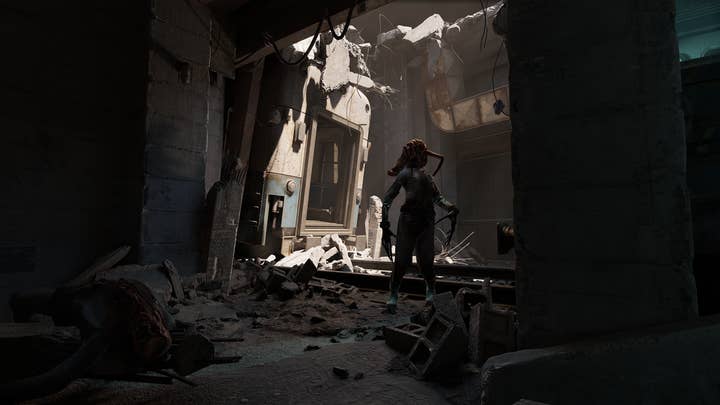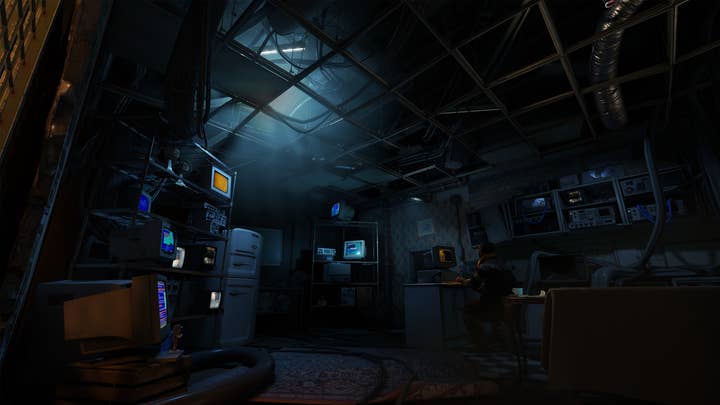Half-Life: Alyx was conceived as a VR title first, and a Half-Life game second
Team members say upcoming VR entry is being built by team members from across Valve, including former Campo Santo devs
Half-Life: Alyx, Valve's upcoming VR entry in the Half-Life franchise that was revealed earlier today, is a team effort across multiple developer teams at Valve, including former members of Campo Santo.
In a video interview conducted by Geoff Keighley, Valve developers David Speyer, Robin Walker, and Dario Casali discussed the conception and creation of Half-Life: Alyx, stating that it had been conceived as a VR game first before it was thought of as a Half-Life game. The goal, they said, was to come out with the big, all-encompassing, AAA, high production value VR title that the platform was currently lacking.
"There are many reasons why it's still hard to justify building something of that scope in VR," said Walker. "We felt like that was a role we could fill, because we can invest in longer-term strategies around putting more effort and time into something than we may expect a return from an audience like VR."
During early experimentation, the team considered both the Half-Life and Portal IPs as options, but rejected Portal due to the likelihood of players becoming sick while using Portals in VR. They then began playtesting different concepts using recycled assets from Half-Life 2 and trying to see what mechanics made sense.
Walker added that while there was certainly pressure to do a Half-Life game well given that one hasn't been made in over a decade, starting with VR first and then applying the Half-Life IP to it made the process easier than he believes it would have been had they tried to make Half-Life 3 from the start.
"Back in 2016 when we started this, Half-Life 3 was a terrifyingly daunting prospect," he said. "To some extent, VR was a way we could fold ourselves into believing we had a way to do this. By starting with VR and then trying to think about Half-Life and how it worked with it, we were immediately in a space where we had something we understand well, Half-Life's core gameplay, and a new platform with new prospects and new possibilities and we could do that transition and watch people play it.
"It was really easy to not try and think about the big picture, like, 'Are we making Half-Life 3?' and just focus on figuring out what people enjoy and make forward progress."

The group also noted that using the Half-Life IP made it easy to recruit internally for the team, with developers from multiple different departments signing on, including several from Valve-acquired studio Campo Santo.
"Half-Life: Alyx has been built by veterans of previous Half-Life games, other developers who are new to the IP, and even some who are new to Valve," Walker said in a separate interview with IGN. "One of the things that excites us about our game is that we've been able to use that combination of past experience and fresh perspective to build something that feels like Half-Life, but doesn't feel dated. Some members of the former Campo Santo studio are on the team, and they've brought the storytelling skill they honed in Firewatch to bear on Half-Life: Alyx."
GamesIndustry.biz has reached out to Valve for comment on the current status of Campo Santo's in-development title, In the Valley of the Gods.
Another point touched on in Keighley's interview was the fact that Half-Life: Alyx would have to remain a VR game, and that the complexity of its VR interactions made it impossible to translate to console or even mouse and keyboard.
"We would love to be delivering a version of this that you could play with a mouse and a keyboard," said Casali. "But as we said, it began as an exploration of VR, and the more we used the controllers and the headset we realized the amount of interactions, the amount of possibilities this gives us, the more we explored it, there's so much opportunity we can't really translate back to the keyboard.
"We would have to map an entire section of the keyboard dedicated just to interacting with doors if we wanted to have that kind of functionality."

